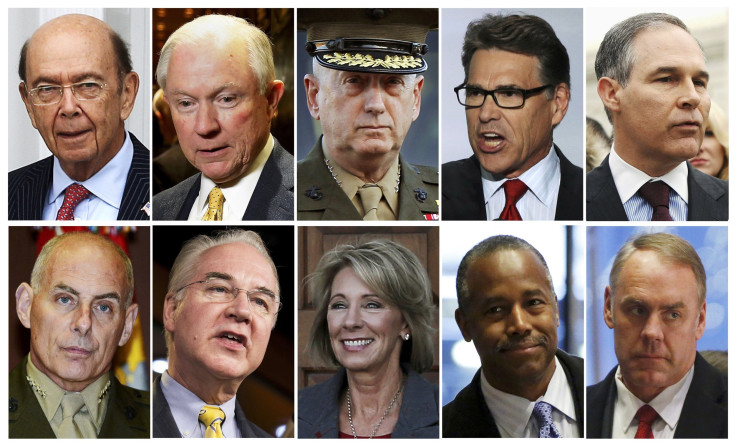'Drain The Swamp' Meaning: Donald Trump Plans To Attack Washington Power Structure Despite What Cabinet Appointments Say

President-elect Donald Trump Thursday said he still plans to “drain the swamp,” despite larding his proposed cabinet with billionaires and lack of an articulated plan for eliminating conflicts of interest while in office.
Former Trump campaign manager Corey Lewandowski downplayed the importance of eliminating lobbyists and influence-peddlers Thursday on “Fox & Friends,” a day after former U.S. House Speaker told NPR Trump regarded the concept as “cute” and plans to drop talk about it.
.@CLewandowski_: For Mr. Trump 'drain the swamp' is probably at the bottom of the list compared to fixing the economy pic.twitter.com/uoGeArnfNx
— FOX & friends (@foxandfriends) December 22, 2016
Not so, Trump tweeted.
And Gingrich decided to take back his remarks.
I goofed. Draining the swamp is in, @realDonaldTrump is going to do it, and the alligators should be worried. #DTS https://t.co/nCHs61gpve pic.twitter.com/OCO7eaSKvk
— Newt Gingrich (@newtgingrich) December 22, 2016
The phrase made for a great campaign slogan, right up there with “lock her up.” But when it came time to put his Cabinet together, Trump turned to major campaign donors in selecting fast-food restaurant executive Andrew Puzder to head the Labor Department, WWE co-founder Linda McMahon to head the Small Business Administration, investor Wilbur Ross to head the Commerce Department, Chicago Cubs co-owner Todd Rickets as deputy commerce secretary, philanthropist Betsy DeVos to head the Education Department and hedge fund operator Steven Mnuchin to head the Treasury Department.
Rewarding major contributors and bundlers with plum assignments is a Washington tradition, witness commerce secretary appointments going to Penny Pritzker under President Barack Obama, Don Evans under George W. Bush, Ronald Brown under President Bill Clinton and Robert Mosbacher under George H.W. Bush.
The six big donors tapped by Trump so far donated, along with their families, $11.6 million to Trump’s campaign. The biggest single contributor was Linda McMahon, who along with her husband Vince, gave $7.5 million, the Washington Post reported.
Trump self-funded his primary run but decided to solicit funds for the general election run, accepting the support of both individuals and PACs.
Trump spent much of the campaign slamming wealthy elites, damning what he called the “corrupt machine” of entrenched political leaders and donors. He made much of Democrat Hillary Clinton’s relationship with Wall Street, saying in a Nov. 6 video Washington power brokers and global special interests have damaged the American working class.
Trump’s post-election actions appear at odds with his campaign rhetoric.
Daniel Weiner, senior counsel at the New York University School of Law’s Brennan Center for Justice, told CNBC Trump is “playing with fire if you ride a wave of anger against the establishment and big-money politics and then practice big money politics.”
Sheila Krumholz, executive director for the Center for Responsive Politics, said Trump is focusing narrowly on the problem, pinpointing lobbyists rather than attacking the bigger picture.
"His focus on lobbyists means he's concerned about it, but he's defining it very narrowly. Insiders will arguably have more power in the next administration given the kind of powerful perch that they're being appointed to," she told CNBC.
© Copyright IBTimes 2024. All rights reserved.












